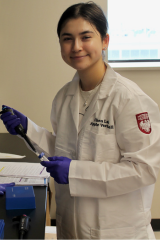The University of Chicago is home to hundreds of the world’s most advanced laboratories and research facilities. The Inside the Lab series gives audiences a first-hand look at the University’s research laboratories and the scholars who are tackling some of the world’s most complex problems.
This includes the Chen Lab, run by Joyce Chen—assistant professor at the University of Chicago’s Pritzker School of Molecular Engineering and Ben May Department for Cancer Research. Apple Verdiell, a rising third-year studying biomolecular engineering works in the lab, who shares more about her experience.

How were you connected to the Chen Lab?
I was looking to join a lab in stem cell research that was associated with the PME since I am a biomolecular engineering student. I looked up PME labs, and the Chen Lab was the one I found most interesting because of their research using stem cells to study cancer.
While the listing was looking for grad students, I applied anyway and followed up. Lucky for me, I was able to get a position.
What do you do there?
Since joining the lab, I’ve been assisting the researchers in their projects—specifically, a bioengineering project where we modify cells to express certain proteins we put in. I have also helped in staining lung cells, as well as passaging cells for experimental use.
In what ways is the Chen lab preparing you for future scientific study?
I knew that I wanted to be involved in research when I applied to UChicago. I am specifically interested in stem cell research, so this lab is a great fit for me. Getting to know what it’s like to actually work in a laboratory environment has been great. I hope to get published at some point, which would be very useful if I decide to apply for a PhD program.
Long term, I hope to be able to grow human organs from stem cells to make organ transplants more accessible and hopefully save lives.